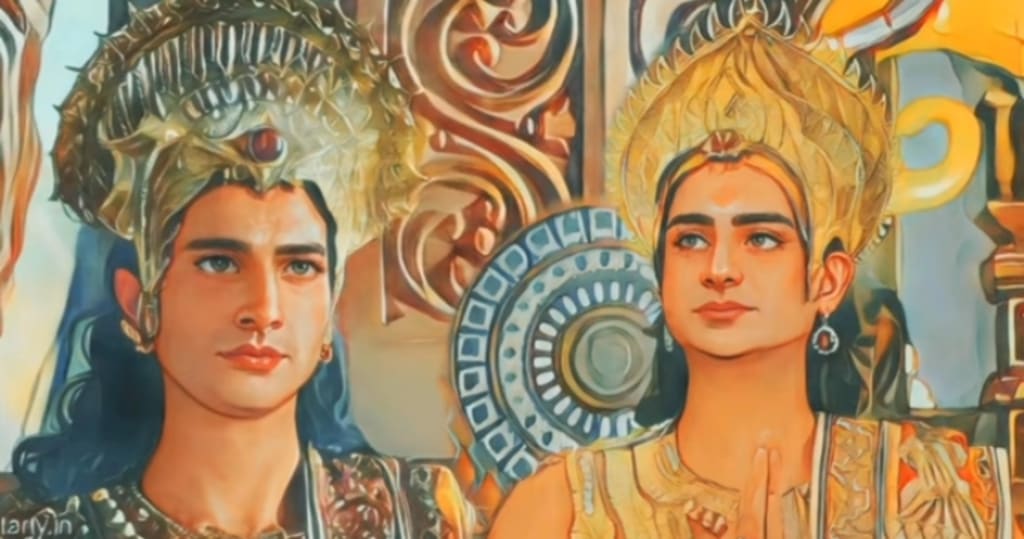Karnan vs dharman who is the best
Karnan's fidelity to Duryodhana is both his topmost strength and his woeful excrescence. Despite knowing the righteousness of the Pandavas' cause, Karnan remains loyal in his support for his friend, indeed when it means fighting against his own sisters. His sense of duty and debt to Duryodhana overshadow his moral judgment, leading to his eventual downfall in the great war of Kurukshetra.

The debate between Karnan and Dharman is a fascinating one, deeply embedded in Indian tradition and artistic narratives. Both characters hail from the grand Mahabharata, which is a rich shade of moral dilemmas, complex characters, and dateless training. To completely understand the significance of this debate, let's claw into the backgrounds and conduct of both Karnan and Dharman, examining their merits, excrescencies, and overall impact on the epic. Karnan, also known as Karna, is one of the most interesting characters in the Mahabharata. Born to Kunti, the mama of the Pandavas, and the sun god Surya, Karnan is raised by a charioteer and his woman
. Despite being of noble birth, Karnan faces demarcation and rejection throughout his life due to his lowly parenting. still, he grows up to be a redoubtable legionnaire, famed for his frippery, skill in archery, and unwavering fidelity to his friend and donator,
Duryodhana. Dharman, generally known as Yudhishthira, is the eldest of the Pandava sisters and embodies righteousness and duty. He's frequently appertained to as Dharmaraja, meaning the king of righteousness. Dharman is known for his adherence to moral principles, commitment to verity, and fidelity to upholding dharma( duty). Throughout the Mahabharata,
he serves as a symbol of virtue and integrity, indeed in the face of multitudinous trials and agonies. One of the most significant aspects of the debate between Karnan and Dharman is the discrepancy between their parenting and social statuses. While Dharman is born into kingliness and enjoys the boons that come with it, Karnan is constantly reminded of his lowly status as a charioteer's son. This contradiction sets the stage for their differing perspectives and conduct throughout the epic.
Karnan's fidelity to Duryodhana is both his topmost strength and his woeful excrescence. Despite knowing the righteousness of the Pandavas' cause, Karnan remains loyal in his support for his friend, indeed when it means fighting against his own sisters. His sense of duty and debt to Duryodhana overshadow his moral judgment, leading to his eventual downfall in the great war of Kurukshetra.
On the other hand, Dharman's commitment to verity and righteousness is unwavering, indeed in the face of adversity. He strives to uphold dharma at all costs, indeed if it means going against his own family members. Dharman's adherence to moral principles earns him respect and admiration from both abettors and adversaries likewise, cementing his status as a eidolon of virtue in the Mahabharata.
The clash between Karnan and Dharman reaches its climax on the battleground of Kurukshetra. In a vital moment, Karnan is disarmed by the god Indra, who disguises himself as a Brahmin and requests Karnan's godly armor and earrings, which render him insurmountable in battle. Despite knowing the true identity of the Brahmin, Karnan chooses to recognize his word and subventions Indra's request, sealing his fate in the process. Dharman's hassle with Karnan on the battleground is inversely significant. In a moment of verity,
Dharman reveals Karnan's royal lineage, thereby admitting his due place among the Kuru tycoons. This disclosure shakes Karnan to the core and forces him to defy the verity of his identity. still, indeed in his final moments, Karnan remains loyal in his fidelity to Duryodhana, refusing to switch sides or abandon his friend. In the end, both Karnan and Dharman meet woeful fates,
albeit for different reasons. Karnan's unvarying fidelity leads to his downfall, while Dharman's commitment to righteousness ensures his palm in the war of Kurukshetra. Their differing paths serve as a memorial of the complex interplay between duty, fidelity, and morality in the epic of Mahabharata. In conclusion, the debate between Karnan and Dharman is a nuanced disquisition of morality, duty, and fidelity. While Karnan exemplifies unwavering fidelity and devotion, Dharman embodies righteousness and adherence to moral principles. Both characters leave a continuing impact on the epic of Mahabharata, serving as dateless symbols of the mortal condition and the eternal struggle between good and evil.
About the Creator
Enjoyed the story? Support the Creator.
Subscribe for free to receive all their stories in your feed. You could also pledge your support or give them a one-off tip, letting them know you appreciate their work.





Comments
There are no comments for this story
Be the first to respond and start the conversation.